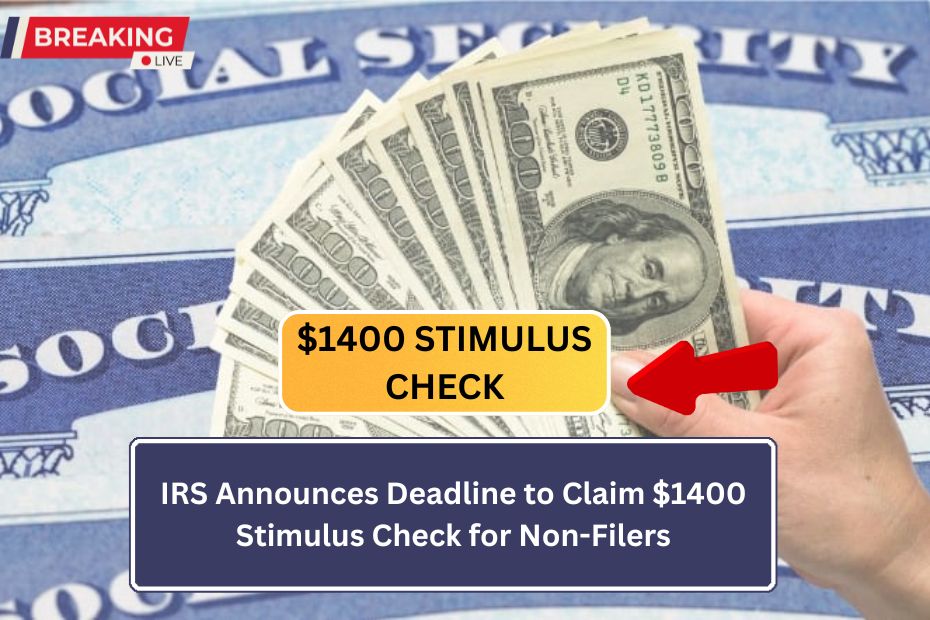The IRS has announced that over a million people are still eligible to receive the $1400 Stimulus Check. This check is part of a $2.4 billion fund aimed at helping people who filed their 2021 tax returns. But what about people who don’t need to file taxes? Let’s break down how eligibility for this payment was decided and what you need to do to claim it.
$1400 Stimulus Check: How Eligibility Was Decided
The IRS distributed the third stimulus check to people who filed their 2021 tax returns. The amount, $1,400, was meant to support individuals who qualified based on income and other factors. However, for those who are not required to file a tax return, the situation is different. Non-filers, or those who don’t file taxes, were not automatically sent a payment.
What Should Non-Filers Do?
For individuals who did not file a 2021 tax return, it’s not too late to claim the stimulus check. To get the $1,400 payment, these individuals must file a tax return. Even if their income was zero, they should still file. This is important because the IRS uses the tax return to determine eligibility for the payment.
The deadline for filing and claiming the stimulus check is April 15, 2025, which gives non-filers enough time to act. Non-filers should file their returns as soon as possible to receive their payment.
How Can Non-Filers File?
Non-filers can submit their tax returns either electronically or by mail. Filing electronically is usually faster, helping the IRS process the information more quickly. Non-filers must ensure that they provide any income information, even if it’s minimal, to avoid any delays in receiving their stimulus check.
Once the IRS processes the return, eligible individuals will receive their stimulus payment. The payment will be directly deposited into the bank account provided on the tax return. If no bank details are given, the IRS will send a paper check instead.
Additionally, the IRS will send a notification letter confirming the payment, giving recipients peace of mind.
Other Benefits of Filing a Tax Return
Filing a tax return, even with little or no income, can provide more financial benefits than just the stimulus check. By filing, individuals may also qualify for other tax credits and refunds, which can offer further support.
It’s a good idea to file a tax return to explore these potential benefits, which might help with financial relief.
What If You Missed Filing Your 2021 Tax Return?
Don’t worry if you missed filing your 2021 tax return. The IRS allows a three-year window for individuals to claim tax refunds or credits. You still have time to file your return and claim the stimulus payment, but make sure to do so before April 15, 2025.
Conclusion
The $1400 stimulus check is available to eligible individuals who file their 2021 tax returns, even if their income is zero. Non-filers need to file their tax returns to claim their payment. Don’t miss the deadline of April 15, 2025, to ensure you don’t miss out on this much-needed financial support.
Filing a return may also provide you with access to other financial benefits, such as tax credits and refunds. So, take action today and file your return to receive the support you deserve.
FAQ’s
Who is eligible for the $1400 stimulus check?
The $1,400 stimulus check is available to individuals who filed their 2021 tax returns. If you didn’t file a tax return and have no income, you need to file to claim your payment. The IRS will not automatically send payments to non-filers.
What happens if I missed filing my tax return for 2021?
If you missed filing your 2021 tax return, it’s not too late! You can still file your return by April 15, 2025 to claim your $1,400 stimulus check. The IRS allows a three-year window to file for refunds or credits.
How do I receive my $1400 stimulus check if I’m a non-filer?
Non-filers need to file a tax return with the IRS to receive their $1400 stimulus check. This can be done electronically or by mail. Once processed, the payment will either be directly deposited or sent as a paper check if no bank details are provided
